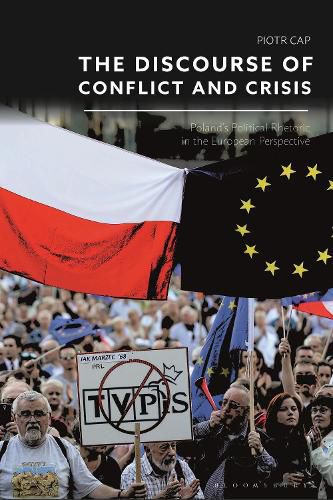Readings Newsletter
Become a Readings Member to make your shopping experience even easier.
Sign in or sign up for free!
You’re not far away from qualifying for FREE standard shipping within Australia
You’ve qualified for FREE standard shipping within Australia
The cart is loading…






This book explores the linguistic patterns of conflict, crisis and threat generation in Polish political rhetoric that have been at the heart of state-level policies since the Law and Justice (PiS) Party came to power in October 2015.
Analysing a vast corpus of speeches, statements and remarks by prominent Law and Justice Party politicians, this book sheds light on internal parliamentary and presidential discourse against opponents of the government, before widening its lens to Poland’s strained relations with the EU regarding refugee distribution and immigration. Drawing on theories from contemporary critical discourse studies and critical-cognitive pragmatics, the book shows how the crisis, conflict and threat elements in these discourses produce public coercion and strengthen the Party’s leadership.
Piotr Cap extends his argument further to examine discursive examples from Hungary, Romania, Bulgaria, Austria, Italy and the UK, highlighting the correlation between the Law and Justice Party and broader socio-political and rhetorical trends in contemporary Europe. The result is an authoritative panorama of the mutual dependencies and shared discursive strategies of European right-wing groups.
$9.00 standard shipping within Australia
FREE standard shipping within Australia for orders over $100.00
Express & International shipping calculated at checkout
This book explores the linguistic patterns of conflict, crisis and threat generation in Polish political rhetoric that have been at the heart of state-level policies since the Law and Justice (PiS) Party came to power in October 2015.
Analysing a vast corpus of speeches, statements and remarks by prominent Law and Justice Party politicians, this book sheds light on internal parliamentary and presidential discourse against opponents of the government, before widening its lens to Poland’s strained relations with the EU regarding refugee distribution and immigration. Drawing on theories from contemporary critical discourse studies and critical-cognitive pragmatics, the book shows how the crisis, conflict and threat elements in these discourses produce public coercion and strengthen the Party’s leadership.
Piotr Cap extends his argument further to examine discursive examples from Hungary, Romania, Bulgaria, Austria, Italy and the UK, highlighting the correlation between the Law and Justice Party and broader socio-political and rhetorical trends in contemporary Europe. The result is an authoritative panorama of the mutual dependencies and shared discursive strategies of European right-wing groups.